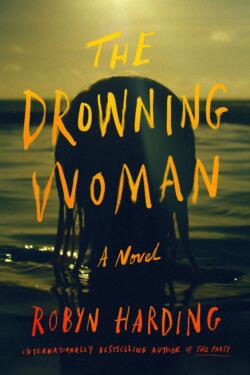1936 Thriller with monstrous, ‘unequivocally irredeemable’ men
The Drowning Woman
by Robyn Harding
Toronto: Grand Central Publishing, 2023
$28.00 / 9781538726761
Reviewed by Jessica Poon
*
 The Drowning Woman by Robyn Harding is disturbing, juicy, riveting, and true to Harding’s previous work—the perfect nocturnal accompaniment to guarantee sleeplessness, but the fun kind. In terms of scandalizing secrets, think Big Little Lies, only with greater socioeconomic disparity and zero children. How could you not want to read that? I do have to warn you, though, that this thriller might momentarily provoke a limited edition version of misandry. Harding’s male characters are pretty much unequivocally irredeemable and monstrous, which services the plot as needed but also leaves scant room for humanity.
The Drowning Woman by Robyn Harding is disturbing, juicy, riveting, and true to Harding’s previous work—the perfect nocturnal accompaniment to guarantee sleeplessness, but the fun kind. In terms of scandalizing secrets, think Big Little Lies, only with greater socioeconomic disparity and zero children. How could you not want to read that? I do have to warn you, though, that this thriller might momentarily provoke a limited edition version of misandry. Harding’s male characters are pretty much unequivocally irredeemable and monstrous, which services the plot as needed but also leaves scant room for humanity.
Lee is a former restauranteur living in her car, waitressing for money under the table, and showering at pools and YMCAs when she can get away with it. When Lee saves Hazel from a suicide attempt, she initially mistakes Hazel for a vapid, spoiled housewife. But Hazel is trapped in a relationship as a coerced submissive—her husband, Benjamin, is beyond sadistic. There is no aspect of Hazel’s life that isn’t micromanaged by Benjamin.
Hazel barely has autonomy over her own body. For instance: “My running addiction made me lean and sinewy, and Benjamin didn’t like it. He insisted I cut my daily jogs from five miles to three and join a gym to build muscle. I consulted with a nutritionist to try to create the body type my husband desired.”

Benjamin goes as far as insisting that Hazel undergo breast augmentation. Basically, Benjamin is the absolute worst. Hazel lives with security cameras watching her every move and with the knowledge that the considerable expenses of her mother’s health care is completely dependent on Benjamin.
Lee’s existence is not remotely enviable—she is estranged from her sister, after trying to blackmail her sister’s cheating husband for money to save her restaurant during the pandemic; she is houseless with no identification and on the run from Damon, a gangster who loaned her money to open the restaurant in the first place and broke one of her fingers. Still, Lee still has considerably more freedom than Hazel.
Ultimately, though, both women are trapped and coincidentally, somewhat phenotypically paired, sufficiently so that with a glow-up, Lee could pass for Hazel, which will be important later. When Lee meets Jesse, a personal trainer, at the car mechanic, she is visibly ill and he gives her an orange, a real citrusy meet-cute: “Our eyes meet and his are not filled with pity or condescension, just human decency…. It’s just an orange, but my throat clogs with emotion.” Frequently, I wanted to shake Lee and say, “I know he’s hot, but come on, girl!”
At times, Vancouver’s Harding (The Perfect Family) can be heavy on the ellipses. Her writing is compelling enough not to require the emphatic three dots, which can get heavy-handed. The dialogue can sometimes be expositional. There’s a lot of food and an arguably unnecessary elaboration of what furikake is in a scene taking place at a ramen restaurant. Plus, a mildly redemptive male character does not exist.
The two most important characters—Lee and Hazel—are normal-ish women in life-threatening circumstances; it’s easy to root for them. Harding has successfully drawn parallels between two very different women, who, at their core, are actually quite similar. Neither Lee nor Hazel have strong female friendships. Sometimes they pass the Bechdel test, if you care about that. Once they become enmeshed in each other’s lives, the possibility for a life outside of a car—perhaps a room of one’s own, husbandlessly—flickers alluringly. Through each other, they learn more about their own respective capacities for ruthlessness.
The Drowning Woman is not merely an entertaining slice of I’m-so-glad-this-isn’t-my-life. It’s also a psychologically astute portrait of how we are not truly individuals when it comes to our desires; we all want the same thing: love, security, and security for those we love.
*

Originally from East Vancouver, Jessica Poon is a writer, former line cook, and a pianist of dubious merit who resides in Toronto. She just completed her MFA in Creative Writing at the University of Guelph. [Editor’s note: Jessica Poon has recently reviewed books by Ian and Will Ferguson, Christine Lai, Logan Macnair, Jen Sookfong Lee, J.M. Miro (Steven Price), Bri Beaudoin, Tetsuro Shigematsu, Katie Welch, Megan Gail Coles, and Ayesha Chaudhry.]
*
The British Columbia Review
Interim Editors, 2023-24: Trevor Marc Hughes (non-fiction), Brett Josef Grubisic (fiction)
Publisher: Richard Mackie
Formerly The Ormsby Review, The British Columbia Review is an on-line book review and journal service for BC writers and readers. The Advisory Board now consists of Jean Barman, Wade Davis, Robin Fisher, Barry Gough, Hugh Johnston, Kathy Mezei, Patricia Roy, Maria Tippett, and Graeme Wynn. Provincial Government Patron (since September 2018): Creative BC. Honorary Patron: Yosef Wosk. Scholarly Patron: SFU Graduate Liberal Studies. The British Columbia Review was founded in 2016 by Richard Mackie and Alan Twigg.
“Only connect.” – E.M. Forster
8 comments on “1936 Thriller with monstrous, ‘unequivocally irredeemable’ men”